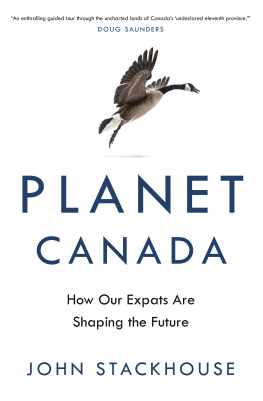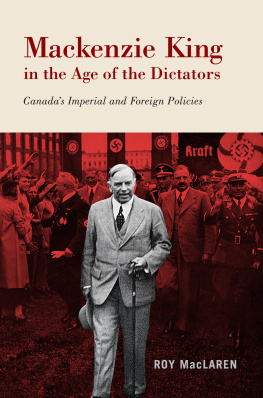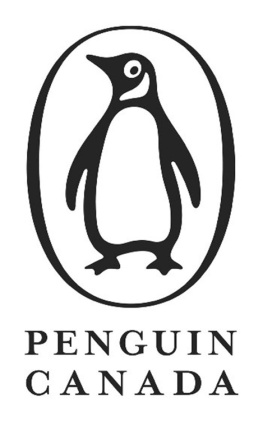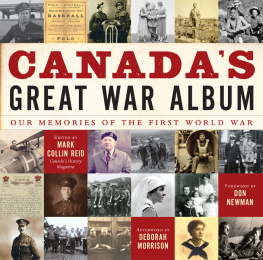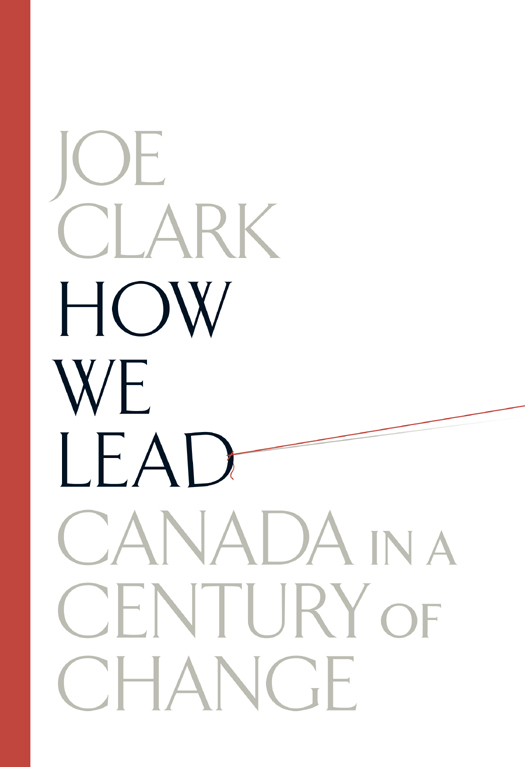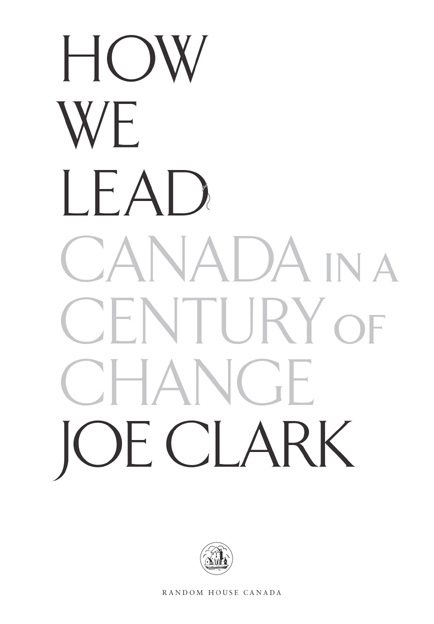PUBLISHED BY RANDOM HOUSE CANADA
COPYRIGHT 2013 RIGHT HONOURABLE JOE CLARK
All rights reserved under International and Pan-American Copyright Conventions. No part of this book may be reproduced in any form or by any electronic or mechanical means, including information storage and retrieval systems, without permission in writing from the publisher, except by a reviewer, who may quote brief passages in a review. Published in 2013 by Random House Canada, a division of Random House of Canada Limited, Toronto. Distributed in Canada by Random House of Canada Limited.
www.randomhouse.ca
Random House Canada and colophon are registered trademarks.
Library and Archives Canada Cataloguing in Publication
Clark, Joe, 1939
How we lead : Canada in a century of change / Joe Clark.
ISBN 978-0-307-35907-0
eBook ISBN: 978-0-307-35909-4
1. CanadaForeign relations. 2. International relations. I. Title. II. Title: Canada in a century of change.
FC242.C53 2013 327.71 C2011-901905-1
Cover design by Five Seventeen
v3.1
To my grandchildren,
Alexandra and Charlie, citizens of the future
CONTENTS
INTRODUCTION
An essential question for citizens of lucky countries is not simply who we are or what we earn, but what we could be. That question implies others: To what do we aspire? What are our talents and advantages and assets? How can we be better than we have been, in our impact on events both inside and outside our country?
Such questions are not just for the lucky. They can be askedthey are askedin the worlds hard places, where despite chaos or conflict or endemic poverty and despair, extraordinary individuals emerge and prevaila Mahatma Ghandi; a Simn Bolivar; a Nelson Mandela. These are usually individual accomplishments, rare explosions of genius or character, but sometimes, on dramatic occasions, they occur across whole communities: South Africa during the 1980s; Europes Eastern Bloc upon the collapse of Soviet communism; the colour revolutions of Central Asia; or more recently, the uprisings of the Arab Spring.
These and similar examples aside, it may not be reasonable to expect such things to happen in a desperately poor country like a Niger, where 75 percent of the population earns less than But aspiration is a reasonable expectation for Canadians, who are among the most prosperous people in any nation, and who have historically responded successfully to the challenge of making ourselves better citizens of our country and of the world. We are a geographically huge and diverse country; but for all the ways that geography defines us, Canada was formed not by accidents of nature but by acts of national will.
The magnitude of Canadas accomplishments warrants recounting: a remarkable confederation of former British colonies that resisted the economic gravity and the evangelic mission of their much more powerful neighbour; innovations that connected the country across a daunting continentfirst a railway, later a national airline, a national broadcaster and cultural institutions like the Canada Council; national guarantees in the Bill of Rights and the Charter of Rights and Freedoms; programs of equalization, pensions and medicare, which confirmed that we are a society as well as a geography; free-trade agreements that facilitated our entrepreneurial instinct; and, from early days, and continuing vibrantly now, millions of wrenching individual decisions to leave family and homelands and become citizens of this evolving immigrant country. Where many nations are shaped by geography or historyislands separated from mainlands, borders drawn by colonial strangersCanada is a built country that has prospered through acts that have shaped our natural assets into national strengths. The risk we face today is that, having built well on lucky groundrich with natural resources and fertile soils, and located far from the worlds conflictswe will now take that prosperity and security for granted and forget how much we still require aspiration and foresight and accomplishment if we want our prosperity to continue.
This book is a reflection on what Canadians have accomplished at our best, specifically in international affairs. And it is a warning that this outward-reaching country could gradually turn inward, and, in the process, depreciate national and personal assets that will become more valuable in the world that is taking shape than they have ever been before.
I will focus on Canadas international potentialwhat we can do to be better off and better respected in a world that is becoming more turbulent and unsettled. The we in question is not just governments; it is also, emphatically, Canadian citizens and organizations (non-state actors), and more generally, the example and the reputation of our country. Any consideration of Canadas international role is also a domestic discussion, because what Canada does in the world is intimately related to who we are at home.
I have had the unusual privilege of learning about our country from two almost-opposite perspectivesfrom the inside as prime minister, minister of constitutional affairs and leader of a national political party that had to compete in every region of Canada in order to form a government. I became the national leader of the Progressive Conservative Party of Canada at age thirty-six, and was so young and so new that the ever-gentle Toronto Star immediately christened me Joe who? I had a lot to learn, so I plunged into the cultures and communities of this country, literally neighbourhood by neighbourhood, interest by interest, learning French, learning the facts, hearing hopes and fears. Fifteen years later, as minister of constitutional affairs, I took our most essential national debate out of the halls of Parliament and into Canadas communities, leading the inclusive and public discussion of the Charlottetown Constitutional Accord. That was Canada from the inside.
At the other extreme, from 1984 to 1991, I experienced a privileged view of Canada as we are assessed from outside our borders. My title was Secretary of State for External Affairs, and I learned first-hand how and why Canada is seen so positively in the eyes of other nations, and came to understand the impact we can have in the wider international community. Those seven years were a period of unusual activity and change in the world: the fall of the Berlin Wall; the end of apartheid; an expanding Canadian presence in Asia and Latin America; and a highly productive time in the relationship between Canada and the United States that produced major treaties on both acid rain and free trade. Canada was an active force literally around the world, from Punta del Este, to Pretoria, to Peshawar, to Paris. That incomparable assignment ended on April 21, 1991, when Prime Minister Brian Mulroney shuffled his cabinet, and I took up responsibility for constitutional affairs. Our daughter, Catherine, described it best that day when she said, So long Paris, hello Moose Jaw.
This book draws upon lessons that I learned in Paris and in Moose Jaw, and in many places between. It is not a memoir but a reflection and a prescriptionan attempt to consider who we Canadians are and have been, and an invitation to envisage what we might become in a world where Moose Jaw and Paris and Peshawar, and everywhere else, are crowding in on one another.
I will concentrate on two challenges that are becoming more imperative in the modern world, and coincidentally for which Canada possesses natural strengths. The first is to help resolve conflict before it explodes. The second is to be a catalyst of co-operation between states and the growing ranks of non-state actors, which are often better than governments at understanding problems and innovating solutions.



